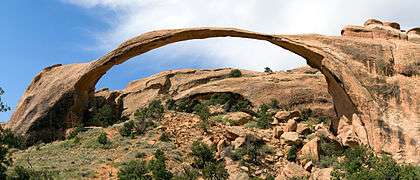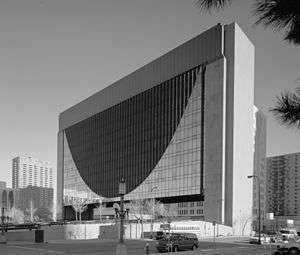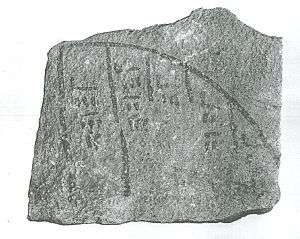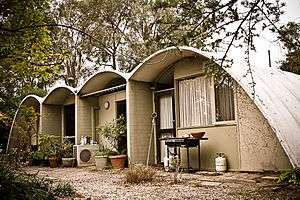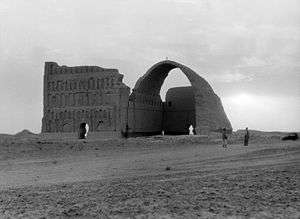Catenary arch
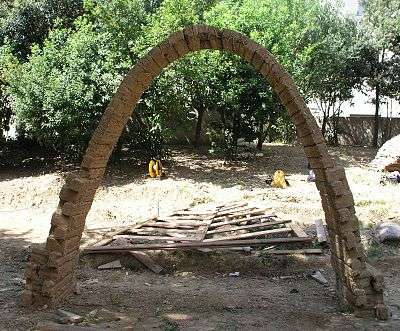

A catenary arch is a type of architectural pointed arch that follows an inverted catenary curve. It is common in cathedrals and in Gothic arches used in Gothic architecture.[1] It is not a parabolic arch.
One note on history
Catenary arches are old. A 1788 note written by Thomas Jefferson reads, I have lately received from Italy a treatise on the equilibrium of arches, by the Abbé Mascheroni. It appears to be a very scientifical work. I have not yet had time to engage in it; but I find that the conclusions of his demonstrations are, that every part of the catenary is in perfect equilibrium. [2]
Note on history
The scientist Robert Hooke observed, "Ut pendet continuum flexile, sic stabit contiguum rigidum inversum", or, "As hangs a flexible cable so, inverted, stand the touching pieces of an arch." [3]
Ability to withstand weight
What makes the catenary arch important is its ability to withstand weight,[4][5] For an arch of uniform density and thickness, supporting only its own weight, the catenary is the ideal curve,.[6]
This is done by a catenary curve: Catenary arches are strong, as they redirect the vertical force of gravity into compression forces pressing along the arch's curve. In a uniformly loaded catenary arch, the line of thrust runs through its center,.[7][8]
Examples
Cathedrals and churches
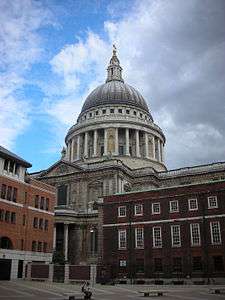
- King’s College Chapel, in Cambridge, England,[9]
- St Paul's Dome,[10]
- Dome of Florence,[11]
- Casa Batlló has catenary arches,[12]
- Casa Mila, in Barcelona, Spain,[13] was designed by Antoni Gaudi, who used many catenary arches,[14][15]
- Church of Colònia Güell,.[16]
Natural arches
Utah’s Kolob Arch has a catenary shape,[17] as does Landscape Arch,[18]
Human-made arches
The Gateway Arch in the American city of Saint Louis, Missouri,[19]
Due to aspect ratio, the top being thinner than the bottom, its actual shape is technically a "weighted catenary",.[20]
High-rises
Marquette Plaza in Minneapolis used catenary arches,.[21][22]
Kilns
Kilns are often designed with catenary arch cross-section,.[23]
Igloos
Igloos are designed with catenary arch cross-section,.[24]
Ancient Egyptians
The unfinished Saqqara ostracon has a catenary shape,.[25]
Other architecture
The inside of Budapest’s Keleti Railway Station forms a catenary arch,[26]
The Nubian ton is a burial vault, of Nubia, For greatest stability, the structure’s cross-section follows a catenary arch,.[27]
The beehive homes (clocháns) of Ireland’s Skellig Michael have a cross-section that follows the style of a catenary arch,.[28]
Homes
The Rice House has catenary arches,.[29]
Hotels
The Icehotel in Sweden employs catenary arches,.[30]
Bridges
A catenary bridge has the form of a catenary arch.
One famous example is the An-Lan Bridge, in China,.[31]
Monuments
In Iraq, the Taq Kasra has the shape of a catenary arch.[32]
Airports
The roof of Washington Dulles International Airport is a suspended catenary curve,.[33]
A catenary steel cable system supports the roof of Denver International Airport.[34]
Train stations
New York City’s Pennsylvania Station has a roof, in the form of a catenary arch.[35]
Banks
On the Federal Reserve Bank of Minneapolis, the building has been remodeled, but still visible is the catenary arch suspending the original building,.[36]
Mud huts
Cameroon's musgum mud huts have a catenary cross-section.[37][38]
See also
- Arch bridge
- Catenary
- Catenary bridge
- Cathedral
- Dome
- Gothic arch
- Lancet window
- Mathematics and architecture
- Parabolic arch
- Simple suspension bridge
- Steel catenary riser
- Vault (architecture)
References
- ↑ Richard L. Handy. "The Perfect Dome".
- ↑ Thomas Jefferson. "Jefferson quote". Retrieved 1 May 2016.
- ↑ "The enigma of Robert Hooke". The enigma of Robert Hooke. Retrieved 27 April 2016.
- ↑ "St. Louis Gateway Arch". enchantedlearning.com. Retrieved 27 April 2016.
- ↑ "Building an arch that can stand up by itself". strath.ac.uk. Retrieved 27 April 2016.
- ↑ "The inverted catenary arch". zonedome.com. Retrieved 27 April 2016.
- ↑ "Build an arch that can stand up by itself" (PDF).
- ↑ Karl Robin Nilsson. "Getting the arch back into architecture" (PDF).
- ↑ "The British Architect". google.com. Retrieved 27 April 2016.
- ↑ "Maths in a minute: St Paul's dome". maths.org. Retrieved 27 April 2016.
- ↑ Nora Hamerman and Claudio Rossi. "Brunelleschi's Dome" (PDF).
- ↑ "Casa Batlló". Retrieved 2 May 2016.
- ↑ "The Catenary Arch". naturalhomes.org. Retrieved 27 April 2016.
- ↑ "The Geometry of Antoni Gaudi". slu.edu. Retrieved 27 April 2016.
- ↑ "Catenary Method" (PDF).
- ↑ "Colònia Güell". barcelonaturisme.com. Retrieved 27 April 2016.
- ↑ Jay H. Wilbur. "The Dimensions of Kolob Arch".
- ↑ Cincinnati Cache Collectors. "Landscape Arch".
- ↑ "Modern Steel Construction" (PDF).
- ↑ Robert Osserman. "How the Gateway arch got its Shape" (PDF).
- ↑ "Marquette Plaza Property Information". Retrieved 2 May 2016.
- ↑ "Platinum Plaza" (PDF). 2 May 2016. Retrieved 2 May 2016.
- ↑ Ken Nagakui (1926). "Kiln Building". Retrieved 30 April 2016.
- ↑ Dan Cruickshank. "What house-builders can learn from igloos". Retrieved 1 May 2016.
- ↑ "An Ancient Egyptian Catenary Construction Curve". 1926.
- ↑ "Budapest". Retrieved 8 May 2016.
- ↑ "Nubian Ton".
- ↑ "Beehive Homes".
- ↑ "Rice House".
- ↑ "Icehotel - facts". ICEHOTEL. Retrieved 27 April 2016.
- ↑ "Suspension Bridge". uoregon.edu. Retrieved 27 April 2016.
- ↑ Chris J K Williams. "Taq Kasra" (PDF).
- ↑ , Jackie Craven. "Dulles Airport".
- ↑ "Denver International Airport".
- ↑ David W. Dunlap (1926). "Penn Station's 5th Redesign Fails to Charm Some Critics".
- ↑ "100 Years of the Ninth District Fed - Federal Reserve Bank of Minneapolis". minneapolisfed.org. Retrieved 27 April 2016.
- ↑ "musgum earth architecture". Retrieved 2 May 2016.
- ↑ Katy Purviance. "Architecture Addiction, The Official Blog of". Retrieved 2 May 2016.
External links
- The use of the catenary arch in architecture
- Natural arches that are catenary arches
- Twisted Physics reference
- Used in building
- More on the catenary, used in arches
- A few catenary arches
- An experiment
- A youtube, all about catenary arches
- A second youtube
- a youtube on building a catenary arch
- Another youtube
